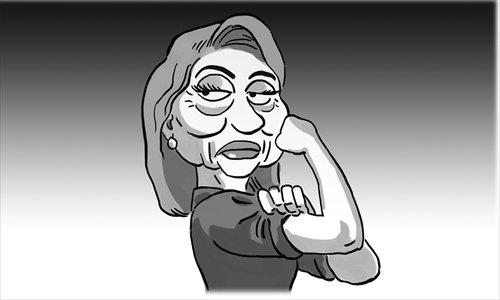

 |
| Illustration: Liu Rui/GT |
Hillary Clinton formally announced she will enter the 2016 presidential race early Monday Beijing time. She enjoys the highest popularity among all the candidates in the Democratic Party and the GOP, and a considerable proportion of Americans favor her. If she wins, the potential changes in US policy on China have quickly become a heated topic in both the Chinese and US media, with some deeming that China will be unavoidably affected.
Clinton is the chief designer of the US pivot to Asia-Pacific strategy. As secretary of state, she urged Washington to "rebalance to Asia" and proposed implementing a "smart power diplomacy" around China to create more leverage to contain the rise of Beijing. Some predict that if Clinton wins her bid for the White House, the pivot to the Asia-Pacific will be strengthened, bringing a greater probability of new conflicts between China and the US.
Such a possibility should not be excluded. However, we also realize the other side of the bilateral relationship, which is the shift of power balance between the two sides has showed a clear trajectory. It takes more than playing little tricks by alienating China and its neighboring countries, or sending more US fleets to the area to "balance" the region.
If China really flexes its muscle in the area, or publicly provokes the US, such as building a military base in the Caribbean and aiming a few missiles at US soil, then every hard-line policy toward China would make sense.
But China has no imperialist ambitions. All we have done and continue to do is focused on development, which has achieved success under the Western-dominated global order. We have initiated the "One Belt and One Road" project and the Asian Infrastructure Investment Bank. Unless the US can counter this vitality, all its "balancing"efforts will be in vain.
If Clinton is elected, the pivot to the Asia-Pacific might grow more energetic, but China's power and capacity have reached new heights, far exceeding that of the recent historical period.
Experience teaches us that US policy toward China is always exaggerated during the run up to presidential elections, but it finally ends up with moderate attitudes and measures. A new US president will have to take responsibility for interests of state, making sure the huge trade volume between the two countries is maintained, and will have to seek more collaboration with China over global hot-button issues.
As for Clinton, she cannot jump out of the constraints of her country's interest either. China should also dedicate itself to expanding the common interests of the two nations. In light of this, whoever wins the race this time, the inseparable ties between the US and China will remain unshaken.
 J-11 fighters in air exercise
J-11 fighters in air exercise Beauties dancing on the rings
Beauties dancing on the rings Attendants-to-be join Mr. & Miss Campus Contest
Attendants-to-be join Mr. & Miss Campus Contest Beijing's toughest anti-smoking law takes effect
Beijing's toughest anti-smoking law takes effect Family lives in cave for about 50 years in SW China
Family lives in cave for about 50 years in SW China PLA soldiers operating vehicle-mounted guns in drill
PLA soldiers operating vehicle-mounted guns in drill Blind carpenter in E China's Jiangxi
Blind carpenter in E China's Jiangxi China hosts overseas disaster relief exercise for the first time
China hosts overseas disaster relief exercise for the first time 20 pairs of twins who will become flight attendants in Sichuan
20 pairs of twins who will become flight attendants in Sichuan Obama is sowing discontent in S.China Sea
Obama is sowing discontent in S.China Sea Rescuers work through night to reach cruise ship survivors
Rescuers work through night to reach cruise ship survivors Driving through limbo
Driving through limbo Facing down MERS
Facing down MERSDay|Week